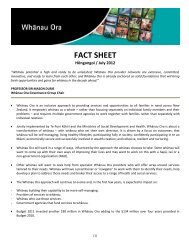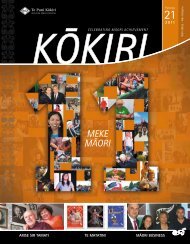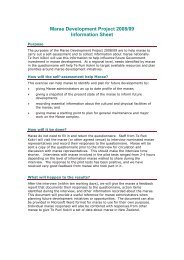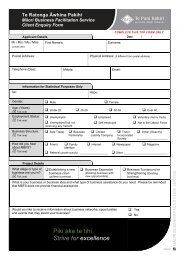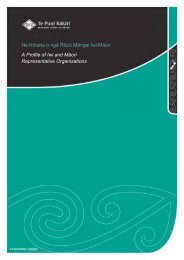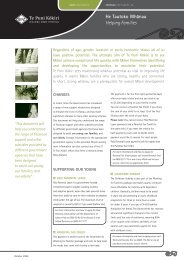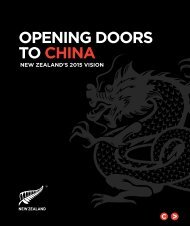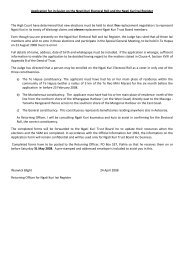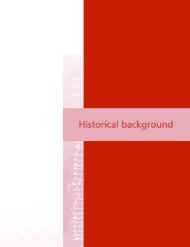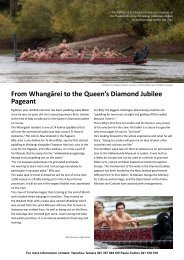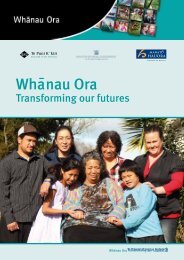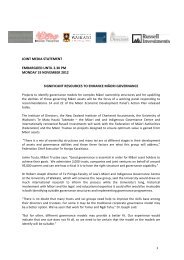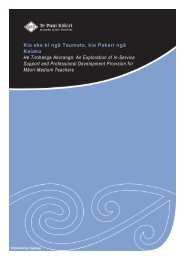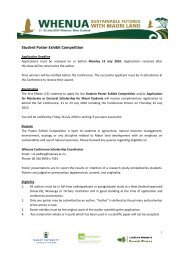Evaluation Report: Mana Social Services: PDF 1.5MB - Te Puni Kokiri
Evaluation Report: Mana Social Services: PDF 1.5MB - Te Puni Kokiri
Evaluation Report: Mana Social Services: PDF 1.5MB - Te Puni Kokiri
- No tags were found...
You also want an ePaper? Increase the reach of your titles
YUMPU automatically turns print PDFs into web optimized ePapers that Google loves.
He Pūrongo Arotake: <strong>Mana</strong> <strong>Social</strong> <strong>Services</strong> Trust (Rotorua)<strong>Evaluation</strong> <strong>Report</strong>: <strong>Mana</strong> <strong>Social</strong> <strong>Services</strong> Trust (Rotorua)
Me mahi tahi tātouLet us work as onePrepared byDr Jarrod Haar (PhD)Ngati Maniapoto, Ngati MahutaAotearoa Centre for Research LimitedDISCLAIMER This publication is intended to provide information on the matters containedherein. It has been written, edited and published and made available to all persons and entitiesstrictly on the basis that its authors, editors and publishers are fully excluded from any liabilityor responsibility by all or any of them in any way to any person or entity for anything done oromitted to be done by any person or entity in reliance, whether totally or partially, on thecontents of this publication for any purposes whatsoever.© <strong>Te</strong> <strong>Puni</strong> Kökiri ISBN 978-0-478-34513-1 JULY 20111 <strong>Mana</strong> <strong>Social</strong> <strong>Services</strong> Trust (Rotorua) – <strong>Evaluation</strong> <strong>Report</strong>, <strong>Te</strong> <strong>Puni</strong> Kōkiri June 2008
CONTENTSEXECUTIVE SUMMARY ..................................................................................... 3INTRODUCTION ................................................................................................. 4EFFECTIVE INTERVENTIONS INITIATIVES ...................................................... 5MANA SOCIAL SERVICES TRUST (ROTORUA): BACKGROUND ................... 6MANA SOCIAL SERVICES TRUST (ROTORUA): PROPOSAL ......................... 8METHODOLOGY .............................................................................................. 12METHODOLOGICAL APPROACH ...................................................................................... 12METHODOLOGICAL LIMITATION ...................................................................................... 14EVALUATION FINDINGS .................................................................................. 15FINDINGS OVERVIEW ........................................................................................................ 15SPECIFIC FEEDBACK ........................................................................................................ 15DISCUSSION .................................................................................................... 25LIMITATIONS & CONCLUSION ........................................................................ 27REFERENCES .................................................................................................. 28APPENDIX 1 ..................................................................................................... 29EVALUATION QUESTIONS ................................................................................................ 29APPENDIX 2 ..................................................................................................... 30MĀORI POTENTIAL FRAMEWORK .................................................................................... 302
EXECUTIVE SUMMARYThe Effective Interventions initiatives arose from a Cabinet directive seeking to reduce thecycle of crime amongst Māori and look for ways to slow the growth of the prison population.This report is an evaluation of an initiative run by <strong>Mana</strong> <strong>Social</strong> <strong>Services</strong> Trust (Rotorua), whichwas funded by <strong>Te</strong> <strong>Puni</strong> Kōkiri. The programme is targeting tamariki aged nine years to 13years, who engage in misdemeanours (e.g. bullying at school) but typically receive minimalattention from Police and the Justice system due to age constraints. The programme wasdeveloped to provide a preventative restorative justice intervention by holding tamarikiaccountable for causing harm or offending and actively involving whānau in the restorativeprocess.This evaluation explored written material on <strong>Mana</strong> <strong>Social</strong> <strong>Services</strong> Trust (Rotorua) initiativeincluding monitoring reports. In addition, an interview was conducted with a <strong>Te</strong> <strong>Puni</strong> Kōkiristaff member who has been involved in supporting the implementation of their initiative, aswell as interviewing the Director of <strong>Mana</strong> <strong>Social</strong> <strong>Services</strong> Trust (Rotorua). Finally, two clientsof the Awhi Whānau initiative (parents of tamariki) were interviewed to gain a first handaccount of the initiative and the changes that the initiative might have effected. Overall, thefindings provided strong support for the Awhi Whānau initiative. The clientele spoke of theirfrustration with other Government departments when trying to get help and support for theirtamariki with issues at school, and the purposeful service the Awhi Whānau initiative providedfor them. Clients spoke of the empathy, support, and cultural understanding they receivedfrom <strong>Mana</strong> <strong>Social</strong> <strong>Services</strong> Trust (Rotorua) and how their tamariki had gained majorimprovements, not only returning to school, but also with their educational performanceimproved after going through the programme. It appears the programme has been successfulin preventing recidivist offending.Within the context of this evaluation, it appears <strong>Mana</strong> <strong>Social</strong> <strong>Services</strong> Trust (Rotorua) isrunning a successful initiative. In addition, it highlighted the pressures associated with shorttermfunding to maintain the organisation‟s ability to break the cycle of suspensions andpotential expulsions from school amongst tamariki, as well as the potential for reducing futurecrime in tamariki. In conclusion, this initiative appears to be successful and is a strongcandidate for future funding.3 <strong>Mana</strong> <strong>Social</strong> <strong>Services</strong> Trust (Rotorua) – <strong>Evaluation</strong> <strong>Report</strong>, <strong>Te</strong> <strong>Puni</strong> Kōkiri June 2008
INTRODUCTIONThis report provides an evaluation on <strong>Mana</strong> <strong>Social</strong> <strong>Services</strong> Trust (Rotorua), which receivedfunding from <strong>Te</strong> <strong>Puni</strong> Kōkiri under the Effective Interventions Programme of Action for Māori.This report is in two sections: Section (1) provides a brief introduction of the EffectiveInterventions Programme, background on the recipient organisation that is the focus of thisreport, <strong>Mana</strong> <strong>Social</strong> <strong>Services</strong> Trust (Rotorua), and outlines their proposal and associatedoutcomes; and Section (2) details the methodology, results and discussion of findingsassociated with the evaluation framework, and provides a brief conclusion and limitationsassociated with the report.The aim of the evaluation is to determine the overall success of the funded EffectiveInterventions Initiatives for <strong>Mana</strong> <strong>Social</strong> <strong>Services</strong> Trust (Rotorua), particularly in meeting goalsacross relevant sectors included in the provided framework. The framework evaluationprocess was designed so that agencies could see what outcomes were met as a result of <strong>Te</strong><strong>Puni</strong> Kōkiri funding the <strong>Mana</strong> <strong>Social</strong> <strong>Services</strong> Trust (Rotorua) initiative. The overall aim of thisevaluation is to indicate the effective linkages between <strong>Mana</strong> <strong>Social</strong> <strong>Services</strong> Trust (Rotorua)and the four sectors related to the Effective Interventions Initiatives namely Ministry of Justice,the Department of Corrections (A Safe and Just Society), the Ministry of Health (Healthy NewZealanders), and the Ministry of <strong>Social</strong> Development (An Inclusive New Zealand).Finally, it is important to put this evaluation into context. The Regional Director‟s letter dated20 December 2007, stated in relation to the Effective Interventions Initiatives programmes,that: “There is also a process underway to extend your delivery of this service to 30 June2010, to enable it to run long enough to be fully evaluated” 1 . Consequently, this evaluationmust be taken in the short-term context of the current 12 months of programme operation.1 Letter to Effective Interventions providers from <strong>Te</strong> <strong>Puni</strong> Kōkiri Regional Directors, 20 December 2007.4
EFFECTIVE INTERVENTIONSINITIATIVESThe Effective Interventions Initiatives is a package of six initiatives that have been funded by<strong>Te</strong> <strong>Puni</strong> Kōkiri in an attempt to slow the growth of the Māori prison population. This is to beachieved through (among many other things):1. addressing the precursors of crime;2. reducing re-offending; and3. reducing Māori over-representation in the criminal justice system.Under the Effective Interventions Initiatives, Cabinet directed <strong>Te</strong> <strong>Puni</strong> Kōkiri and the Ministry ofJustice to report to Cabinet Policy Committee with a programme of action relating to Māori. InMay 2007 <strong>Te</strong> <strong>Puni</strong> Kōkiri and the Ministry of Justice presented the Programme of Action forMāori for consideration. The Programme of Action for Māori aims to inform policies,programmes and services in the justice sector aimed at reducing offending and imprisonmentamong Māori. This includes investing in a suite of practical initiatives designed, developed anddelivered by Māori, and identifying sustainable funding options for these initiatives 2 .At its meeting on 10 December 2007, the Cabinet Business Committee (CBC) - amongst otherthings 3 :a. directed <strong>Te</strong> <strong>Puni</strong> Kōkiri to continue to fund the six initiatives until 30 June 2008;b. noted that <strong>Te</strong> <strong>Puni</strong> Kōkiri will have completed formative evaluations for each of the sixinitiatives by 31 May 2008 and the findings will be provided to relevant agencies; andc. directed the Ministry of Justice, the Ministry of <strong>Social</strong> Development, the Ministry of Health,the Ministry of Education and the Department of Corrections to identify appropriate fundingfrom existing baseline resources to fund the six initiatives from 1 July 2008 to 30 June2010, subject to appropriate monitoring and evaluation results.Overall, there are six initiatives that were funded and this report evaluates the initiative relatingto <strong>Mana</strong> <strong>Social</strong> <strong>Services</strong> Trust (Rotorua).2 He Pānui, <strong>Te</strong> <strong>Puni</strong> Kōkiri Memorandum, Whakapānga kōnae: EI Initiatives, 13 December 2007.3 He Pānui, <strong>Te</strong> <strong>Puni</strong> Kōkiri Memorandum, Whakapānga kōnae: EI Initiatives, 13 December 2007.5 <strong>Mana</strong> <strong>Social</strong> <strong>Services</strong> Trust (Rotorua) – <strong>Evaluation</strong> <strong>Report</strong>, <strong>Te</strong> <strong>Puni</strong> Kōkiri June 2008
MANA SOCIAL SERVICES TRUST(ROTORUA): BACKGROUND<strong>Mana</strong> <strong>Social</strong> <strong>Services</strong> Trust (Rotorua) was established by the previous Director, MaxineRennie, and a small group of other community members in July 1996, in response to a needfor professional counselling and social services for Māori in particular and for others in need inthe Rotorua community. Mr Don Bennett, the current Chairperson of the Trust, is one of thosefounding members. Theresa Heywood has been the Director of <strong>Mana</strong> <strong>Social</strong> <strong>Services</strong> Trust(Rotorua) since December 2006, having been the Trust‟s <strong>Mana</strong>ger of <strong>Social</strong> <strong>Services</strong>.Theresa‟s background includes working in the Department of Internal Affairs, the Ministry ofEducation and Prisoner‟s Aid and Rehabilitation Trust in Rotorua. She has a Bachelor ofApplied <strong>Social</strong> Sciences, with a major in <strong>Social</strong> Work.SERVICES PROVIDED BY THE TRUST INCLUDE: Counselling and social services Advocacy Conflict resolution and anger management Family/whānau group work Relationship counselling and family therapy Educative programmes e.g. Responsible Parenting, Self Esteem/Life skills, Clean Anger Child Protection Education, Non Violence Education for Youth, Men, Women, and Children Restorative Justice Programme for Adults Diversion Scheme for first time offenders <strong>Social</strong> Worker in Schools. Student Restorative Justice (Awhi Whānau Programme) for 9-13 year olds Problem Gambling support6
FUNDING FOR THE TRUST COMES FROM THE FOLLOWING SOURCES: Ministry of Justice – Crime Prevention Unit New Zealand Children and Young Persons and Their Families Agency Ministry of Justice – Adult Restorative Justice Programme <strong>Te</strong> <strong>Puni</strong> Kōkiri, Ministry of Māori Development – Awhi Whānau NZ Police – Diversion Scheme <strong>Te</strong> Kahui Hauora Trust – Problem GamblingRESTORATIVE JUSTICE PROGRAMMEIn July 1999 the Trust was successful in securing a contract with the Crime Prevention Unit tore-establish a community-based Restorative Justice Programme. Restorative Justice seeks tomove beyond condemnation and punishment to address both the causes and consequencesof offending in ways that promote accountability, healing and justice. They were one of 14successful Restorative Justice Programmes operating in New Zealand at the time and theyhad the highest referral numbers of Māori clients. This programme has also been shared withiwi of Tūwharetoa, Ngāti Raukawa of Tokoroa and Whakatōhea, and was being considered byNgai <strong>Te</strong> Rangi and Ngāti Awa. An Upper Hutt group has also used this programme toestablish Restorative Justice in their area. This has provided the Trust with a strongbackground and successful experience in restorative justice that has enabled the Trust to beconfident enough to provide the current initiative.DIVERSIONIn 2000 the Trust took over the running of the Police Diversion Scheme for first time offenders.Referral rates initially achieved by the Rotorua Police were up to 100 cases annually, and thishas since increased to around 300 cases annually since that initiative has been run by <strong>Mana</strong><strong>Social</strong> <strong>Services</strong> Trust (Rotorua). The Trust believe this increase is due to their establishedreputation, and the strong community links that <strong>Mana</strong> <strong>Social</strong> <strong>Services</strong> Trust (Rotorua) continueto strengthen and maintain. These existing programmes highlight the extensive experienceand established reputation that the Trust has.7 <strong>Mana</strong> <strong>Social</strong> <strong>Services</strong> Trust (Rotorua) – <strong>Evaluation</strong> <strong>Report</strong>, <strong>Te</strong> <strong>Puni</strong> Kōkiri June 2008
MANA SOCIAL SERVICES TRUST(ROTORUA): PROPOSAL<strong>Mana</strong> <strong>Social</strong> <strong>Services</strong> Trust (Rotorua) noted that in 2002, nearly 5000 young people weresuspended from school and more than 1400 were excluded. <strong>Mana</strong> <strong>Social</strong> <strong>Services</strong> Trust(Rotorua) kaupapa is based on keeping young people engaged in education as the way toreduce youth offending. They suggest that schools play a crucial role in helping to keep „highrisk‟ youth off the streets and out of courts. The Trust noted in their proposal that statisticsshow that a sizable proportion (22%) of all criminal offending in New Zealand was committedby young people under the age of 17.The proposal from <strong>Mana</strong> <strong>Social</strong> <strong>Services</strong> Trust (Rotorua) initiative is called Awhi Whānau andrelates to assistance for the following activities 4 : providing a community based preventative intervention programme for nine to 13 year oldsthat will help deter programme participants‟ progress towards juvenile offending through theutilisation of holistic restorative practices. Hence, restorative justice is a key element of theAwhi Whānau initiative. The initiative allows whānau and schools to make referrals for theservice. Typically, only schools are able to initiate contact, so the whānau approach isunique to Awhi Whānau; and <strong>Mana</strong> <strong>Social</strong> <strong>Services</strong> Trust (Rotorua) utilises a collaborative approach in their serviceprovision, engaging other service providers including agencies and community basedorganisations to provide the best outcomes for tamariki and their whānau.<strong>Mana</strong> <strong>Social</strong> <strong>Services</strong> Trust (Rotorua) proposed target group includes all tamariki aged nine to13 years (although younger and older tamariki will be included as far as it involves the widerwhānau). For example, an older or younger brother will not be excluded from the whānauprocess if their age is outside this range. Awhi Whānau targets tamariki who engage inmisdemeanours such as bullying but who typically receive minimal attention from Governmentagencies due to age constraints. For example, at this age the Police are not typically involved.Outcomes that <strong>Mana</strong> <strong>Social</strong> <strong>Services</strong> Trust (Rotorua) were contracted by <strong>Te</strong> <strong>Puni</strong> Kōkiri todeliver are: reduction in the number of tamariki involved in repeat misdemeanours; effectively retaining and maintaining tamariki at school; and reducing the number of stand downs, suspensions and expulsions.The investment logic for the proposal from <strong>Mana</strong> <strong>Social</strong> <strong>Services</strong> Trust (Rotorua) related tostrengthening the organisation‟s ability to offer Awhi Whānau to the target tamariki: aligningcapacity with demand and improving how <strong>Mana</strong> <strong>Social</strong> <strong>Services</strong> Trust (Rotorua) responds tothe needs of clients. This is in response to growing demand from the Rotorua community (inparticular whānau) for a greater say and interaction in tamariki issues at school. The proposal4 <strong>Mana</strong> <strong>Social</strong> <strong>Services</strong> Trust (Rotorua) Effective Intervention Contract with <strong>Te</strong> <strong>Puni</strong> Kōkiri, 22 March 2007.8
sought to provide resources to assist the allocation of clients to <strong>Mana</strong> <strong>Social</strong> <strong>Services</strong> Trust(Rotorua) workers at a level that supports quality service delivery, recognising the potentialgrowth in service volume and demand amongst tamariki aged nine to 13 years. The <strong>Mana</strong><strong>Social</strong> <strong>Services</strong> Trust (Rotorua) Awhi Whānau initiative builds on an existing framework andinitiative targeting older children. Hence, this initiative focuses on an additional (new) agegroup with new schools and whānau units. The organisation needed to add new personnel toprovide the new Awhi Whānau initiative.Awhi Whānau is a programme which focuses on strengthening and/or maintaining educationalachievement for tamariki, and at the same time strengthening and maintainingtamariki/whānau relationships, (whanaungatanga). Awhi Whānau is a whānau driven process,and/or a school directed process. As such, either group (schools or whānau) can contact<strong>Mana</strong> <strong>Social</strong> <strong>Services</strong> Trust (Rotorua) to engage their services. This might stem from thetamariki being bullied at school or from them being a bully at school, with disruptive behaviourlikely to lead to the suspension or expulsion of the tamariki from school. This kaupapa isbased on whānau engagement, which allows whānau to engage the Trust‟s services ratherthan responding solely to school based referrals, as was the norm.The initiative takes a holistic approach by engaging and participating with the whānau unit andbuilds a future crime prevention plan through whānau development. In this regard, the Trustbelieves by addressing tamariki problems at an early stage links to future crime can beaddressed and thus nullified. It is based on restorative justice, which focuses on repairing therelationship in the school between students, principals, tamariki and whānau (e.g. badlanguage at teacher, or tamariki bullying etc.). The initiative seeks to ensure the tamariki isheld accountable but then also placed back into school, and ensuring issues are dealt withand completed. Tamariki also understand that if they misbehave again, then they are likely tobe expelled (for example, through having multiple suspensions). The Trust monitors thetamariki behaviour through both its own employees and through liaison with the school andteachers. While the initiative is based on interacting with the whānau unit, it also encompassesall cultures, although Māori are the predominant users of their service. The Awhi Whānauprogramme means the tamariki are not worked with in isolation, and there is an expectationthat tamariki will be supported by whānau (whether it is a parent, nana, koro, schoolcounsellor etc.). <strong>Mana</strong> <strong>Social</strong> <strong>Services</strong> Trust (Rotorua) noted that all tamariki have had thatsupport and that has been a key component of the success of the initiative.Originally (previous to this funded initiative), all Rotorua schools used to drive the engagementof <strong>Mana</strong> <strong>Social</strong> <strong>Services</strong> Trust (Rotorua) but now it is whānau driven. The funding has allowedwhānau to seek the Trust‟s services to improve and fix issues with their tamariki. Previously,schools used to get the reports from the Trust and make all decisions, but now there is greaterwhānau involvement and decision making, with whānau being able to engage and makesuggestions where previously they used to have to accept decisions made by the schools (i.e.take decisions rather than make decisions). The importance of whānau involvement is thatwhānau are aware of and understand the situation straightaway, which might otherwise nothave been the case. The programme has no set time frame and when tamariki are judged tobe okay, and the whānau has the right strategies, then the intervention comes to a close. Allparticipants have a follow up after one month, to provide assistance if the tamariki happens tobe going backwards. Hence, a relationship with tamariki and whānau continues after theprogramme has officially closed to ensure long-term success. <strong>Mana</strong> <strong>Social</strong> <strong>Services</strong> Trust(Rotorua) maintains this helps the whānau and how they engage with their tamariki.9 <strong>Mana</strong> <strong>Social</strong> <strong>Services</strong> Trust (Rotorua) – <strong>Evaluation</strong> <strong>Report</strong>, <strong>Te</strong> <strong>Puni</strong> Kōkiri June 2008
whānau to make strong, positive, life-changing choices about the importance of school andeducation and deal with related issues that are making the tamariki‟s behaviour at schoolquestionable or untenable. While some of these issues are specifically related to behaviour atschool, for example being bullied or being a bully, <strong>Mana</strong> <strong>Social</strong> <strong>Services</strong> Trust (Rotorua) notesthat such behaviour is typically related to external (non-school) issues. For instance, it mightbe due to death of a major caregiver or family dynamics including separating parents. Byinvolving the whānau, the wider issues are firstly discovered and understood then they areable to be dealt with. It is this interaction and wider whānau approach that meets the aims ofthe Effective Interventions Initiatives, engaging tamariki at the earliest stages where theirtroubles might be manifested at school and at home to prevent potential future offending. TheTrust suggests that by engaging these tamariki and dealing with issues of self esteem, parentseparation, bullying etc., they are able to re-engage tamariki in the education system andimprove their performance at school and their potential contribution to society in the future. Inessence, tamariki and their whānau, in seeking help from <strong>Mana</strong> <strong>Social</strong> <strong>Services</strong> Trust(Rotorua) initiative are able to empower themselves to right misdemeanours that might in thefuture lead to major dealings with the justice system due to illegal activity and criminalbehaviour.11 <strong>Mana</strong> <strong>Social</strong> <strong>Services</strong> Trust (Rotorua) – <strong>Evaluation</strong> <strong>Report</strong>, <strong>Te</strong> <strong>Puni</strong> Kōkiri June 2008
METHODOLOGYData was collected from a number of sources including the <strong>Mana</strong> <strong>Social</strong> <strong>Services</strong> Trust(Rotorua) funding proposal and associated monitoring reports. Interviews were undertakenwith a number of stakeholders and ranged in time from a half hour to two hours. Specifically: a <strong>Te</strong> <strong>Puni</strong> Kōkiri staff member involved in the funding proposal for <strong>Mana</strong> <strong>Social</strong> <strong>Services</strong>Trust (Rotorua). This was to provide supplementary material to the written information onthe evaluated organisation; a <strong>Te</strong> <strong>Puni</strong> Kōkiri staff member involved in liaison and providing expert advice andinteraction with <strong>Mana</strong> <strong>Social</strong> <strong>Services</strong> Trust (Rotorua). This was to provide in-depthunderstanding of how the organisational running of the proposal has been achieved,highlighting any specific achievements and challenges; the Director (Tumuaki/CEO) of <strong>Mana</strong> <strong>Social</strong> <strong>Services</strong> Trust (Rotorua). This was to providean organisational perspective on their proposal, their service, and any specificachievements and challenges. This also allowed for aspects of this evaluation to beconducted with the help of <strong>Mana</strong> <strong>Social</strong> <strong>Services</strong> Trust (Rotorua), in particular whānaumembers who have been through the service provided by the Trust; and two parents of tamariki who had utilised the services of <strong>Mana</strong> <strong>Social</strong> <strong>Services</strong> Trust(Rotorua) were interviewed. These stakeholders were chosen as they represented a typicalwhānau experience of the service. In consultation with <strong>Mana</strong> <strong>Social</strong> <strong>Services</strong> Trust(Rotorua) and the whānau members, telephone interviews were conducted as this was aless invasive method of data collection. Confidentiality was assured to these participants toenable them to answer freely and reveal whatever aspects they would like to raise. Further,to make the process as expedient as possible, <strong>Mana</strong> <strong>Social</strong> <strong>Services</strong> Trust (Rotorua)provided me with a confidential brief on each case so less time was needed for theinterviews with whānau/parents as they did not have to provide context for theirexperiences.A number of interview questions were asked to gain an indication of the effectiveness of theinitiative and how the overall operation of the proposal was achieved. Appendix 1 has theinterview questions. For some individuals interviewed (e.g. tamariki parents/clients), not allquestions were used as these would fundamentally fall outside of some participants‟experiences.METHODOLOGICAL APPROACHLinda Smith‟s ground breaking work Decolonizing Methodologies: Research and IndigenousPeople (1999) talked about understanding the Māori perspective, which is fundamentallyshaped by:1. A history of research on Māori that has helped shaped negative attitudes about research.12
2. Western research being considered to have dehumanised Māori and denied the validationof Māori knowledge, language and culture. This has led some Māori to reject all research. 6Fundamentally, these aspects pose a great challenge for research on Māori. Kaupapa MāoriResearch Methodology is an attempt to retrieve Māori research for Māori, and it provides afocus through which Māori people, as communities of researchers and the researched, havebeen able to engage in dialogue regarding new priorities, policies and practices for research,for, by, and with, Māori. A Kaupapa Māori Research Methodology approach towards datacollection for this evaluation was the most appropriate way for successfully completing theevaluation while maintaining the cultural integrity of <strong>Mana</strong> <strong>Social</strong> <strong>Services</strong> Trust (Rotorua), itsstaff, clients, and stakeholders (as the evaluation subject), the researcher himself (as theevaluator), and ultimately <strong>Te</strong> <strong>Puni</strong> Kōkiri (as the body overseeing the evaluation process forEffective Interventions Initiatives).By the very nature of this evaluation, <strong>Mana</strong> <strong>Social</strong> <strong>Services</strong> Trust (Rotorua) and Māori peopleare being evaluated. This has connotations due to the inherent negativity associated with suchundertakings. Consequently, it is vital for such evaluations to be as understanding as possible.While a kaupapa Māori approach might encourage data collection that is kanohi ki te kanohi(face-to-face), understanding that some stakeholders might find this approach too intrusiveand thus prefer a telephone interview, is one way in which understanding this approach canbe useful for interacting with Māori communities. With Kaupapa Māori Research Methodology,there are a number of implications for undertaking research in Māori communities. Ofrelevance to the present evaluation, these include that research should be „culturally safe‟;have scientific rigour; be undertaken with a Māori worldview (e.g. holistic); have a goal ofempowerment; have a whānau focus; be aligned with the Treaty of Waitangi, and beundertaken by a researcher with empathy for Māori 7 . This evaluation meets theseexpectations by being as culturally safe as possible while maintaining as much scientific rigouras possible in the circumstances. It is undertaken with a holistic Māori worldview, focuses onan initiative which is whānau-focused, and aims to empower both <strong>Mana</strong> <strong>Social</strong> <strong>Services</strong> Trust(Rotorua) as the service provider, the whānau interviewed and <strong>Te</strong> <strong>Puni</strong> Kōkiri as the funder.Finally, the evaluation is conducted by an experienced Māori researcher with empathytowards Māori communities.One issue relating to an evaluation process, especially one relating to a non-governmentorganization‟s funding, is the process of success and failure, of achieving or not achieving.Consequently, an evaluation is a value laden process that immediately triggers issues relatingto being evaluated and whether this evaluation is positive or negative. However, this must becountered by the reality and need for public money to be scrutinized to ensure it is effectivelyand efficiently managed. One way that the researcher for this evaluation achieved a level ofequity with the organisation‟s members and clients was to understand the organisation, itskauapapa, its past reports relating to the proposal (e.g. monitoring reports), to ensure that ahigh level of understanding was apparent from the beginning. The intention is to achieve alevel of interaction where issues pertinent to the evaluation can be discussed, analysed andevaluated. However, this was somewhat countered by the nature of funding from Governmentagencies and the expectations that <strong>Mana</strong> <strong>Social</strong> <strong>Services</strong> Trust (Rotorua) will have regardingaccountability. Namely, proposals are submitted, evaluated, and contracts are awarded, and6 Smith, L. T. (1999). Decolonizing Methodologies: Research and Indigenous People. London: Zed Books Ltd.7 Smith, L. T. (1999). Decolonizing Methodologies: Research and Indigenous People. London: Zed Books Ltd.13 <strong>Mana</strong> <strong>Social</strong> <strong>Services</strong> Trust (Rotorua) – <strong>Evaluation</strong> <strong>Report</strong>, <strong>Te</strong> <strong>Puni</strong> Kōkiri June 2008
the nature of reports and evaluations are established practices and a „reality‟ between parties.However, it is worth noting that <strong>Mana</strong> <strong>Social</strong> <strong>Services</strong> Trust (Rotorua) monitoring reportsappear to be highly structured and effective for providing detailed information. Clearly, theyare able to produce reports of a high standard and consequently, are able to understand andappreciate the context and dynamics of this evaluation process.Using Kaupapa Māori Research Methodology implications as a guideline, it was important thatparticipants understood that the evaluation was focused upon their stories as related to theproposal and their associated outcomes, and was not an exercise in trying to ascertain ordetermine blame for any potential issues. For example, when engaging the parents of tamarikiit was important not to suggest blame towards the parents for the actions and problems oftheir tamariki. The present study was conducted by an experienced Māori academic with astrong empathy for Māori, whānau and the not-for-profit sector, and followed establishedscientific rigour with respondent data being validated through monitoring reports and analysedaccordingly. Finally, the focus on tamariki, whānau, Tikanga Māori and empowerment alignthe present study strongly with the aims of Kaupapa Māori Research Methodology as they metthe needs of the stakeholders.METHODOLOGICAL LIMITATIONThere are some limitations in the methodological approach of this evaluation. For example,there was a short timeframe for the evaluation which meant the ability to interview largenumbers of clients was constrained. This limits the findings of the evaluation, although this is acommon issue with such evaluations. This limitation is important because there are a widerange and number of stakeholders interacting with <strong>Mana</strong> <strong>Social</strong> <strong>Services</strong> Trust (Rotorua) thatwere outside the scope of this evaluation to interview. However, this is a natural limitation ofthis type of evaluation. In addition, potential selection bias through clients being selected by<strong>Mana</strong> <strong>Social</strong> <strong>Services</strong> Trust (Rotorua) or <strong>Te</strong> <strong>Puni</strong> Kōkiri might also limit the evaluation.However, <strong>Mana</strong> <strong>Social</strong> <strong>Services</strong> Trust (Rotorua) know the clientele and who would be willingto participate in an evaluation of this type. Further, <strong>Mana</strong> <strong>Social</strong> <strong>Services</strong> Trust (Rotorua)would be in the best position to determine whether a client has a wider interpretation of theirservice and whether they are emotionally able to contribute to the evaluation. In summary,there are limitations inherent in this evaluation although these are not critical to theevaluation‟s aims of assessing the early impact of the initiative delivered by <strong>Mana</strong> <strong>Social</strong><strong>Services</strong> Trust (Rotorua).14
EVALUATION FINDINGSFINDINGS OVERVIEWOverall, it appears that the initiative run by <strong>Mana</strong> <strong>Social</strong> <strong>Services</strong> Trust (Rotorua) has beensuccessful. From the perspective of <strong>Te</strong> <strong>Puni</strong> Kōkiri staff, there appears to be strong gainsmade by <strong>Mana</strong> <strong>Social</strong> <strong>Services</strong> Trust (Rotorua) towards specific outcome delivery throughproviding their service to a number of tamariki and their whānau. From within the organisation,there is a strong sense of achievement and progress in what is clearly a challenging service.Importantly, the Trust asserts demand for their Awhi Whānau service (initiative) is increasingas the reputation and outcomes of their service become widely known and acknowledged.From the evaluation, it is clear <strong>Mana</strong> <strong>Social</strong> <strong>Services</strong> Trust (Rotorua) have achieved a lot fromtheir funding, particularly from an operational perspective: specifically the number of casesundertaken (83 cases). <strong>Mana</strong> <strong>Social</strong> <strong>Services</strong> Trust (Rotorua) feel they have had majorsuccess in breaking the cycle of violence and minor offending amongst tamariki and this hashad a major positive impact on multiple sectors (e.g. justice, health, education etc.). Feedbackfrom clients has reinforced a sense of success towards the proposed outcomes, andillustrated that the initiative has impacted favourably and significantly on clients and theirinteractions within multiple sectors. The initiative has clearly had a major impact on tamariki,and where their future lies: instead of criminal behaviour and a future in the Justice system,there is now a chance to realise their full potential and be a contributor to New Zealandsociety.SPECIFIC FEEDBACKThe following sections provide an analysis of specific questions that were part of theevaluation review.Question 1: Brief description of the intervention, including processThe information relating to the intervention and its processes is detailed in earlier sections ofthis evaluation (see sections four to six).Question 2: Who designed the initiative/came up with the idea?<strong>Mana</strong> <strong>Social</strong> <strong>Services</strong> Trust (Rotorua) designed the initiative based on experience in this fieldof restorative justice. <strong>Mana</strong> <strong>Social</strong> <strong>Services</strong> Trust (Rotorua) runs a programme of restorativejustice for adults and due to feedback from the community and schools, they were asked totake a similar initiative into the schools. They saw a large number of tamariki – especiallyMāori, being stood down from schools. Consequently, the original programme (pre-dating thisinitiative) was directed at going into the schools and getting meetings but with minor whānauinvolvement. In essence it could have been viewed as a school directed approach. <strong>Mana</strong><strong>Social</strong> <strong>Services</strong> Trust (Rotorua) could see that there were areas of improvement needed asthe original concept was a “band aid” approach. Hence, they took a wider, holistic approach,to determine what was making tamariki have these problems and issues and consequently,this involved examining and involving whānau in the overall process15 <strong>Mana</strong> <strong>Social</strong> <strong>Services</strong> Trust (Rotorua) – <strong>Evaluation</strong> <strong>Report</strong>, <strong>Te</strong> <strong>Puni</strong> Kōkiri June 2008
This holistic approach means the whānau also get to look at their tamariki and their friendsand peers at school. The Trust spoke of how whānau were often unaware of the people theirtamariki were socialising with until participating in the initiative. This is seen as being a majorbenefit of the whānau involvement, with whānau also benefiting from the initiative. It alsomakes the whānau more accountable so they know what is happening and can play a part inrectifying problems. <strong>Mana</strong> <strong>Social</strong> <strong>Services</strong> Trust (Rotorua) noted that there appears to be abreak down in whanaungatanga amongst many clients, where a sense of belonging andrelationships are lacking. Consequently, the initiative is based on re-engaging tamariki andwhānau to ensure whanaungatanga is strong. <strong>Mana</strong> <strong>Social</strong> <strong>Services</strong> Trust (Rotorua) assertedthat even if a tamaiti doesn‟t have a parent living with them or able to be engaged, there isalways someone there they can attach too, and this could be nanny, auntie, koro etc. Also, inrelation to developing the initiative, <strong>Mana</strong> <strong>Social</strong> <strong>Services</strong> Trust (Rotorua) noted they look forthe trends within school suspensions and expulsions and adapt their programmes andspecifically this initiative to the changes. They noted that their programmes are tailor madeand adapted to the needs of tamariki and whānau: hence, each programme is unique. Anotherunique aspect is involving tamariki with making their own resources (e.g. relating to angermanagement for instance). Similarly, offering the initiative in <strong>Te</strong> Reo Māori ensures there isgreater buy-in amongst participants who speak <strong>Te</strong> Reo Māori as their preferred language.Question 3: Who 'owns' the initiative? Who governs it?The Director of <strong>Mana</strong> <strong>Social</strong> <strong>Services</strong> Trust (Rotorua) felt there was no single owner of theinitiative. She said the initiative was owned by those involved in the process which includesthe tamariki, their whānau, the schools, the community, hapū and iwi and <strong>Mana</strong> <strong>Social</strong><strong>Services</strong> Trust (Rotorua) itself. She noted this reinforces the holistic approach of theirinitiative.One important aspect of this initiative is that it has been driven by the community, who haveseen issues and growing problems with tamariki at school. As such, the initiative is a widercommunity owned initiative that is overseen by <strong>Mana</strong> <strong>Social</strong> <strong>Services</strong> Trust (Rotorua).Question 4: Why was the initiative developed?As noted previously, the initiative was driven by the changing needs of tamariki and theirwhānau. The Director of <strong>Mana</strong> <strong>Social</strong> <strong>Services</strong> Trust (Rotorua) noted the initiative wasdeveloped from their experience and knowledge of working in their community and thecommunity‟s desire to have their younger tamariki attended to because the community(especially the schools) could see the benefit of such an initiative.Question 5: Who delivers/delivered the initiative?<strong>Mana</strong> <strong>Social</strong> <strong>Services</strong> Trust (Rotorua) has delivered the initiative and noted that they haveleveraged their years of experience, skills and contacts to achieve success in the initiative.The organisation noted that they have managed and run the initiative well, achieving greatersuccess than originally hoped for by having 83 whānau through the Awhi Whānau initiative.One benefit of an experienced provider like <strong>Mana</strong> <strong>Social</strong> <strong>Services</strong> Trust (Rotorua) is that theyare able to break down barriers with tamariki, whānau, schools, and communities through thevarious links, networks, and expertise. <strong>Mana</strong> <strong>Social</strong> <strong>Services</strong> Trust (Rotorua) emphasised thatat all times, the initiative is delivered in a holistic way.16
Question 6: To whom are they accountable (apart from TPK) and how?<strong>Mana</strong> <strong>Social</strong> <strong>Services</strong> Trust (Rotorua) has a Trust Board and trustees that they areaccountable to. This ensures the organisation undertakes strict financial controls andreporting. Similarly, given the initiative is based in the schools and community, <strong>Mana</strong> <strong>Social</strong><strong>Services</strong> Trust (Rotorua) is also aware that their mahi is always accountable to thecommunity. Hence, they strive to ensure they are doing a good job and work hard atdeveloping and maintaining solid long-term relationships. Further, <strong>Mana</strong> <strong>Social</strong> <strong>Services</strong> Trust(Rotorua) is accountable to other funding providers including Child, Youth and Family ensuringit develops and maintains strong infrastructure to maintain credibility and accountability.Question 7: To what extent has the provider delivered the outcomes TPKcontracted for? And what are the learnings from this?<strong>Mana</strong> <strong>Social</strong> <strong>Services</strong> Trust (Rotorua) noted they had exceeded their expected outcomes fromthis initiative, with the organisation stating that they had “tripled their numbers”, achievingmore than they ever had previously. The organisation had a major learning from providing thisinitiative relating to the service skills of its workers. The organisation noted the other servicesthey provide (and had been for some time) were useful for providing overlapping skills whichenhanced their ability to deliver Awhi Whānau. The Director of <strong>Mana</strong> <strong>Social</strong> <strong>Services</strong> Trust(Rotorua) noted Awhi Whānau “gained from these other works”. While the roles are distinct,the focus on restorative justice in the community and with whānau provides contacts andexperiences which are similarly useful for <strong>Mana</strong> <strong>Social</strong> <strong>Services</strong> Trust (Rotorua) to leveragefor its tamariki clientele. The Director also highlighted personal mātauranga regarding handson experience and overseeing all cases, to provide adequate support for <strong>Mana</strong> <strong>Social</strong><strong>Services</strong> Trust (Rotorua) employees, to ensure they did not get burnout from dealing withpotentially highly stressful cases.<strong>Mana</strong> <strong>Social</strong> <strong>Services</strong> Trust (Rotorua) noted that one of their outcomes related to a reductionin suspension rates and the Director suggested a large proportion of tamariki have nowremained in school thanks to the initiative. Clearly, the performance aspects of this initiativehave been met.The Director noted that as they have raised the profile of <strong>Mana</strong> <strong>Social</strong> <strong>Services</strong> Trust(Rotorua) and the Awhi Whānau initiative, so too have they got more referrals. The Directorhighlighted that a longer timeframe is required to adequately assess the benefits of AwhiWhānau on suspension rates, but believes they have been exceeding expectations. Anadditional strength of <strong>Mana</strong> <strong>Social</strong> <strong>Services</strong> Trust (Rotorua) has been their monitoring reportswhich have included a number of written feedback/evaluations from participating whānau andtamariki. These show there have been many positive outcomes from Awhi Whānau, not leastthe reductions in Māori tamariki suspensions from school.One client interviewed for this evaluation spoke of the benefits the Awhi Whānau initiative hadon their child. The issue related to the tamariki being a bully at school and the parent hadcalled on <strong>Mana</strong> <strong>Social</strong> <strong>Services</strong> Trust (Rotorua) and their Awhi Whānau initiative as a meansto rectify the tamariki‟s behaviour. The parent noted their child had “an attitude problem” andhad turned into a bully at school. This in turn, had lead to issues with the school seeking tosuspend the tamariki for their behaviour. The parent noted that <strong>Mana</strong> <strong>Social</strong> <strong>Services</strong> Trust(Rotorua) “did an awesome job” and the school was really pleased too. The parent said “theydid a cool job” with the tamariki. The parent also noted that her tamariki had become muchmore settled at school and home, and that the tamariki had “changed heaps”.17 <strong>Mana</strong> <strong>Social</strong> <strong>Services</strong> Trust (Rotorua) – <strong>Evaluation</strong> <strong>Report</strong>, <strong>Te</strong> <strong>Puni</strong> Kōkiri June 2008
The client spoke about their frustrations at seeking help initially from “<strong>Social</strong> Welfare” and howthey failed to follow up on the parent‟s request. As such, they felt abandoned by the State.However, after hearing about the Awhi Whānau programme and calling on their help, she saidthings have turned around in a major way for her tamariki. The parent believes their child hadbenefited directly from the program by <strong>Mana</strong> <strong>Social</strong> <strong>Services</strong> Trust (Rotorua) and that it “wastheir [tamariki‟s] chance”. The parent noted that it has worked and continues to work, manymonths after the tamariki had completed the course.When the client was pressed about the importance of the kaupapa Māori approach used by<strong>Mana</strong> <strong>Social</strong> <strong>Services</strong> Trust (Rotorua), it was noted that this was “vitally important” and wasvery valuable not only to the parent, but as the parent stated, “it was important for my tamarikitoo”. The tamariki felt this way because they initially had felt isolated and thought no one caredor listened to their issues. Hence, the importance of a kaupapa Māori approach to thisrestorative justice initiative offered by <strong>Mana</strong> <strong>Social</strong> <strong>Services</strong> Trust (Rotorua) was stronglysupported for being culturally appropriate. Further, the parent stated that they “wouldrecommend them” (<strong>Mana</strong> <strong>Social</strong> <strong>Services</strong> Trust (Rotorua)) to other parents and friends if theyhad similar issues, highlighting the satisfaction this whānau unit had in their experience withthe initiative. Finally, the parent noted that the “one on one talking really helped – with privacyand communication” and that the tamariki “could say anything and he opened up”. Shereinforced this benefit by saying the one-on-one talking “was important” and overall, highlyrecommended the initiative, having nothing but praise for <strong>Mana</strong> <strong>Social</strong> <strong>Services</strong> Trust(Rotorua).The other client interviewed for this evaluation also spoke of the benefits the Awhi Whānauinitiative had on their tamariki and their experiences were very similar to the client discussedabove. The issue for this tamariki was an event at school where they were the victim but theirresponse was to no longer wish to attend school, which was ultimately leading the student tobe suspended and ultimately, expelled. Similar to the experiences of the other client, theparent found a distinct lack of support from government agencies regarding their particularcase. The parent noted they “kept getting passed around various agencies and no one wouldhelp them!” The parent also stated that they and their tamariki “felt they weren‟t listened to”.Consequently, the whānau then called on <strong>Mana</strong> <strong>Social</strong> <strong>Services</strong> Trust (Rotorua) and theirAwhi Whānau initiative as a means to rectify the issue facing their tamariki. The parent relayedtheir frustration about the lack of support and suggested that without the intervention by <strong>Mana</strong><strong>Social</strong> <strong>Services</strong> Trust (Rotorua), there would not have been a positive outcome for their child.This highlights the important role that the initiative Awhi Whānau can potentially play in thewider Rotorua community.When discussing the Awhi Whānau initiative, the parent noted that the service by <strong>Mana</strong> <strong>Social</strong><strong>Services</strong> Trust (Rotorua) was “awesome”, “wicked” and “fantastic” because “both me and mychild were listened to”. They found the Awhi Whānau initiative to be a major improvement overwhatever else was available and the parent noted “I‟d recommend them” due to her high levelof satisfaction. The parent enjoyed the one on one advocacy from the initiative and noted thatit helped privacy and communication. As with the first client, it was felt this was “veryimportant” and highlighted a major benefit and point of difference from the initiative. Similar tothe other client, this whānau felt the kaupapa Māori approach was vital and a key ingredientinto why the initiative worked so well for the Māori tamariki.The parent noted that after the programme had been completed the tamariki is now back atschool and doing well. They stated “academically, he‟s doing much better also”. The parentfelt certain the child was destined to never want to return to school and was highly18
appreciative of the support that their whānau received from <strong>Mana</strong> <strong>Social</strong> <strong>Services</strong> Trust(Rotorua). The parent kept reinforcing the importance of the kaupapa of the initiative and howit was able to communicate with Māori at “our level”. Clearly, the Awhi Whānau initiative ismaking a positive impact by being „By Māori, for Māori‟ and with a strong understanding ofKaupapa Māori. As with the first client, the kaupapa Māori approach to this restorative justiceinitiative meant there was strong support for it. Finally, the parent noted that an additionalbenefit of the initiative by <strong>Mana</strong> <strong>Social</strong> <strong>Services</strong> Trust (Rotorua) was that the parent got tolearn and understand their rights (regarding the school and their tamariki). The parent notedthat they did not have a good understanding and <strong>Mana</strong> <strong>Social</strong> <strong>Services</strong> Trust (Rotorua) “putme right about my rights!” Clearly, for whānau to be engaged in important education andrestorative justice issues with tamariki, having an advocate for both tamariki and whānau isimportant for ensuring the most positive outcomes are achieved for all.Question 8: Describe any additional outcomes produced by this initiative, andthe benefits of those outcomes (added value).As noted above by the client, engaging tamariki to deal with their issues and encouragingthem to change their behaviours where needed, means the restorative justice can encourageand facilitate change. There are other benefits towards multiple sectors that are achieved,over and above the outcomes associated with the initiative. For example, not only havesuspension rates for tamariki reduced, there are many other additional benefits from AwhiWhānau including: strengthening of whānau units; strengthening of Māori culture through a kaupapa Māori approach; reduction in violence through changing the behaviour of tamariki bullies at school (lessviolence on fellow students/tamariki); reduction in violence through changing the behaviour of tamariki bullies/angered tamariki athome (less violence on whānau e.g. younger children in the whānau unit); improved educational outcomes and performance; improved relationships between whānau and schools; improved relationships between whānau and <strong>Mana</strong> <strong>Social</strong> <strong>Services</strong> Trust (Rotorua); improved relationships between <strong>Mana</strong> <strong>Social</strong> <strong>Services</strong> Trust (Rotorua) and schools; whānau empowerment through teaching whānau their rights and encouraging andsupporting their participation in decision making processes regarding their tamariki andwhānau and education; self esteem benefits for tamariki; and increased awareness of the outcomes of violence and misdemeanour crimes by tamariki.Question 9: Elaborate the links between initiative outcomes (including thosethat were not contracted for) and the cross-agency outcomes frameworkThe focus of the Effective Interventions Initiatives package was to facilitate change. Further,there was an expectation that such positive change would have a positive flow-on effectacross a number of sectors. This has been classified in a framework, shown in Appendix 2.19 <strong>Mana</strong> <strong>Social</strong> <strong>Services</strong> Trust (Rotorua) – <strong>Evaluation</strong> <strong>Report</strong>, <strong>Te</strong> <strong>Puni</strong> Kōkiri June 2008
Inter-sector links with JusticeThe Effective Interventions Initiative Awhi Whānau by <strong>Mana</strong> <strong>Social</strong> <strong>Services</strong> Trust (Rotorua)links well with the Justice Sector Outcomes Framework specifically: reduced victimisation by tamariki when they are the victim of bullying or a crime; changing the behaviour of tamariki so they do not victimise others such as when they arethe bully; reduced victimisation by tamariki within the whānau unit when a tamariki is the bully within awhānau unit; reduced repeat victimisation by developing self esteem in tamariki enabling them to cope,manage, and overcome obstacles from victimisation; reduced repeat victimisation by developing self esteem in tamariki and teaching themstrategies to cope with anger, enabling them to better manage and become productivemembers of whānau and school, rather than bullies that cause victimisation; the Awhi Whānau initiative purposefully seeks to develop the resilience of tamariki to therisk of misdemeanour crimes and the likely long-term outcomes of such behaviour; the Awhi Whānau initiative supports rangatahi who may be victims whether from whānauissues or relating to school based actions; the Awhi Whānau initiative also supports the whānau and other tamariki; through building self esteem and improving educational performance, it reduces thelikelihood of tamariki engaging in crime; through building self esteem it reduces the likelihood of tamariki being victims (e.g. beingbullied at school); the initiative may also reduce the reoffending of perpetrators (at this stage ofmisdemeanour crimes, but potentially more serious crimes in the future); and the work by <strong>Mana</strong> <strong>Social</strong> <strong>Services</strong> Trust (Rotorua) means the Justice system through thisinitiative adapts to meet the needs of Māori.Inter-sector links with Ministry of <strong>Social</strong> DevelopmentThe Effective Interventions initiative by <strong>Mana</strong> <strong>Social</strong> <strong>Services</strong> Trust (Rotorua) links well withthe Ministry of <strong>Social</strong> Development Outcomes Framework specifically: providing resources (including training and development) to support tamariki to play afunctional role in society – particularly personal development; providing resources (including training and development) to support whānau to play afunctional role in society – in particular with their tamariki; providing a safe and secure environment for the tamariki to learn at school. This includesboth in a safe physical space and also a supportive whānau – which may include a homewithout domestic violence and reduced violence potential; providing a safe and secure environment for the tamariki through teaching them a safetyplan;20
creating a strong and resilient whānau through whānau development and empowerment; creating a whānau who interacts with their tamariki and is productive in the community andtowards the tamariki‟s schooling; through training and development creating whānau who are strong in decision making; through training and development creating whānau units who have the knowledge,capabilities and skills to look after tamariki; enhanced links with marae, whānau, hapū and iwi; tamariki and whānau are free from abuse, neglect, offending and violence; enhanced whānau skills has lead to tamariki being reunited with their whānau creatingpermanent and stable whānau units or being relocated with other whānau to provide a safeand crime and drug free environment; tamariki have a secure and enhanced standard of living; tamariki are in education and attending school regularly; tamariki play a role in decision making; and tamariki have healthy social relationships.Inter-sector links with Department of CorrectionsThe Effective Interventions initiative by <strong>Mana</strong> <strong>Social</strong> <strong>Services</strong> Trust (Rotorua) also links withthe Department of Corrections Outcomes Framework specifically: victims of crime are supported through the service provided by <strong>Mana</strong> <strong>Social</strong> <strong>Services</strong> Trust(Rotorua) – specifically through support for tamariki; similarly, victims of crime are supported through the Awhi Whānau initiative becausetamariki who are bullies have their behaviour modified, which ensures these victims aresupported through the behaviour stopping (e.g. bullying); and misdemeanour crime is reduced through eliminating and reducing offending.Inter-sector links with Ministry of HealthThe Effective Interventions initiative by <strong>Mana</strong> <strong>Social</strong> <strong>Services</strong> Trust (Rotorua) also haspotential links with elements of the Ministry of Health Outcomes Framework specifically: potential for improvement in healthy life expectancy through reduced violence by and on thetamariki; potential for improvement in healthy life expectancy through enhanced self esteem andwillingness to remove destructive behaviours (e.g. bullying) and through a willingness toremove destructive behaviours within a whānau unit including alcoholism, drug taking, andviolence etc. For example, in Awhi Whānau they can encourage a family to move tamarikito closer whānau members with non-drug and alcoholic environments; regular attendance of school for tamariki enhances and improves views of the educationsystem and provides opportunity for future employment opportunity and personal growthopportunity;21 <strong>Mana</strong> <strong>Social</strong> <strong>Services</strong> Trust (Rotorua) – <strong>Evaluation</strong> <strong>Report</strong>, <strong>Te</strong> <strong>Puni</strong> Kōkiri June 2008
potential for improvement in mental health status of tamariki and their whānau membersthrough improved self esteem; and potential for improvement in life expectancy rates, mortality rates, and healthy lifeexpectancy rates may all lower the inequities by ethnicity.Inter-sector linksOverall, this intervention has multiple positive outcomes across a range of sectors (beyondeducation). The links identified above have been diagrammatically shown on the evaluationframework for the Awhi Whānau initiative (Appendix 3).Question 10: Which outputs/throughputs produced the contracted outcomes,and how?The outcomes achieved by the Awhi Whānau initiative from <strong>Mana</strong> <strong>Social</strong> <strong>Services</strong> Trust(Rotorua) are fundamentally tied into the costs of salaries, which make up the majority ofexpenses for the contracted outputs and includes mainly social workers and someinfrastructure support (e.g. administrator and Director). <strong>Mana</strong> <strong>Social</strong> <strong>Services</strong> Trust (Rotorua)deals with a large and growing volume of tamariki aged nine to 13 years. This places heavyemotional pressure and demand upon the Trust. The funding initiative has allowed <strong>Mana</strong><strong>Social</strong> <strong>Services</strong> Trust (Rotorua) to provide a service that they have previously been unable tofund, specifically for younger tamariki and their wider whānau unit. This holistic and inclusivekaupapa Māori approach requires additional staff, training and resources. <strong>Mana</strong> <strong>Social</strong><strong>Services</strong> Trust (Rotorua) has a strong and growing reputation in the Rotorua community, buttheir focus on short-term funding means they are often unable to explore additional serviceopportunities such as the Awhi Whānau initiative. This initiative has been successful becauseit has provided <strong>Mana</strong> <strong>Social</strong> <strong>Services</strong> Trust (Rotorua) with the human resources to provide aservice that enables and helps tamariki deal with issues in a whānau setting with a kaupapaMāori, holistic approach.The Director of <strong>Mana</strong> <strong>Social</strong> <strong>Services</strong> Trust (Rotorua) noted that “reducing suspensions is the„tip of the iceberg‟ because this is a complex issue, which Awhi Whānau addresses”. TheDirector noted the costs in time are well spent because the initiative means the tamariki arenot looked at in isolation, stating “the suspensions are just one dimension”. The Directoracknowledged there are many reasons why tamariki might engage in antisocial behaviour,and Awhi Whānau is able to empower whānau to make decisions, to interact, and make goodchoices for the tamariki and the whānau. The initiative also sees <strong>Mana</strong> <strong>Social</strong> <strong>Services</strong> Trust(Rotorua) trying to achieve successful outcomes for all parties involved (e.g. tamariki, whānau,school, community etc.). The Director stated this can be challenging because they achievethis “without stepping on anyone‟s mana”. The Director also noted this holistic approachfocused on respect, mana, and integrity, with everyone respecting everyone else, includingtamariki and schools (and vice-versa). This complex, holistic approach is a fundamentalstrength of the initiative but also one that requires greater time and resources thanconventional service design.<strong>Mana</strong> <strong>Social</strong> <strong>Services</strong> Trust (Rotorua) has the ability and necessary skills and expertise toimplement this initiative that will, in the long term, benefit the wider Rotorua community. It ishard to show links between tamariki who have been through the programme and potentialfuture links to crime due to (1) the age constraints (ages of nine to 13 years means there aremany years before they could come before the Courts for more serious crimes thanmisdemeanours), and (2) it is impossible to know whether tamariki would have gone on to22
commit crimes if they had not completed the Awhi Whānau initiative. However, there are clearlinks in international literature between misdemeanour criminal behaviour in children andyouth escalating to more serious crimes in adulthood. Consequently, the long-term benefits ofthis initiative, while difficult to demonstrate (and especially so after only one year), are likely tomake a significant impact to reduce future criminal behaviour.Question 11: To what extent did the provider deliver the outputs TPKcontracted for?The Director of <strong>Mana</strong> <strong>Social</strong> <strong>Services</strong> Trust (Rotorua) noted they have delivered the outputs“far and beyond!” the contract expectations and their reported service provision does supportthis (currently 83 whānau cases). The Director noted <strong>Mana</strong> <strong>Social</strong> <strong>Services</strong> Trust (Rotorua)was able to achieve such gains through great team work and good staffing. An additional staffmember has been recruited to <strong>Mana</strong> <strong>Social</strong> <strong>Services</strong> Trust (Rotorua) recently to provide amale role model for tamariki, as male Māori social workers are very uncommon. <strong>Mana</strong> <strong>Social</strong><strong>Services</strong> Trust (Rotorua) have made a strong effort in delivering their initiative and beensuccessful in delivering the outputs <strong>Te</strong> <strong>Puni</strong> Kōkiri have contracted for.One concern regarding the long-term success of the Awhi Whānau initiative run by <strong>Mana</strong><strong>Social</strong> <strong>Services</strong> Trust (Rotorua) would be forcing the organisation back into a funding loopwhere they must spend a lot of time chasing funding. Clearly, an issue for all Non-GovernmentOrganisations is securing long-term funding, and this would clearly impact on the Trust‟sability to offer their current service and maintain the reductions in suspensions and expulsionsamongst tamariki. Further, to demonstrate significant reductions in suspensions andexpulsions would require a long-term focus and as such, the Awhi Whānau initiative requiresfurther time to support evaluation of impact (and this is likely to require a few years).Question 12: Output costs (the sum of the actual outputs or throughputsdivided by total contract cost)The total funding provided for the Awhi Whānau initiative run by <strong>Mana</strong> <strong>Social</strong> <strong>Services</strong> Trust(Rotorua) was $258,000 8 . The total number of tamariki and whānau who have been throughthe Awhi Whānau initiative is 83 (currently). As such, the output costs per tamariki andwhānau is $3108.43.Question 13: To what extent has or will this initiative work(ed) for Māori?From interviews with <strong>Te</strong> <strong>Puni</strong> Kōkiri staff, the Director of <strong>Mana</strong> <strong>Social</strong> <strong>Services</strong> Trust(Rotorua), and their clientele, it is evident that this initiative has been a big success in makingfundamental changes for Māori where previous options have not achieved good results. Thissuccess relates both to Māori tamariki and their whānau unit. There was strong feedback fromclients that their experiences with other Government departments and agencies were notpositive, with a common theme of being misunderstood, ignored, or feeling irrelevant. Further,it appears evident the kaupapa Māori approach undertaken and embraced by <strong>Mana</strong> <strong>Social</strong><strong>Services</strong> Trust (Rotorua) is a key ingredient in the success of the Awhi Whānau initiative.This initiative is built upon kauapapa Māori and Tikanga Māori and the whānau holisticapproach is tied into the experience and leverages the expertise of <strong>Mana</strong> <strong>Social</strong> <strong>Services</strong>8 Notes of the Maori Programme of Action Meeting to Discuss Funding (Cabinet‟s 10 December 2008 Directive).Thursday 14 February 2008, 4pm, Ministry Of Justice, Charles Ferguson Building, Level 11.23 <strong>Mana</strong> <strong>Social</strong> <strong>Services</strong> Trust (Rotorua) – <strong>Evaluation</strong> <strong>Report</strong>, <strong>Te</strong> <strong>Puni</strong> Kōkiri June 2008
Trust (Rotorua) to make successful and positive gains for Māori tamariki and their whānau.Feedback from whānau regarding why there are positive gains for their tamariki indicates thatthe traditional non-Māori approach simply does not work for their tamariki and them (thewhānau unit). They find it is unable to cater for their cultural needs and expectations.Consequently, there is strong support for this as a promising initiative meeting the needs ofMāori.Question 14: Has/will it work(ed) better than anything else?As noted above in Question 13 and throughout this evaluation, the Awhi Whānau initiativeappears to have been very successful for Māori and enabled <strong>Mana</strong> <strong>Social</strong> <strong>Services</strong> Trust(Rotorua) to make significant progress and gains to reduce tamariki suspensions andexpulsions from school. From stakeholder feedback, it appears the kaupapa Māori approach,with whānau and cultural understanding, and a „by Māori for Māori‟ approach, has provided aservice that is far superior to anything else offered towards tamariki with issues and problemsarising at school. <strong>Mana</strong> <strong>Social</strong> <strong>Services</strong> Trust (Rotorua) noted that the initiative was also bestfor all stakeholders – not only tamariki and whānau, but also the schools and communities, asthey worked in a positive and non-confrontational manner seeking the most positive outcomesfor tamariki but without over-riding concerns of other stakeholders. The organisation alsonoted the importance of the funding the organisation received from <strong>Te</strong> <strong>Puni</strong> Kōkiri. Thishighlighted the value of a „by Māori for Māori‟ approach with <strong>Te</strong> <strong>Puni</strong> Kōkiri being seen as apositive Government influence for Māori. This reflects an important aspect of buy-in by Māoristakeholders (tamariki and their whānau) and highlights the complexities facing organisationsseeking to provide effective services in Māori communities. Overall, it appears the initiativehas worked better than anything else in the past.Question 15: Stipulate the methods used to elicit the answers to all of thesequestionsAs noted in the methodology section (section 7), the responses to these questions are basedon interviews with <strong>Te</strong> <strong>Puni</strong> Kōkiri staff, the Director of <strong>Mana</strong> <strong>Social</strong> <strong>Services</strong> Trust (Rotorua)and two clients (whānau members) of <strong>Mana</strong> <strong>Social</strong> <strong>Services</strong> Trust (Rotorua). In addition,multiple documents relating to the Effective Interventions Initiatives, <strong>Mana</strong> <strong>Social</strong> <strong>Services</strong>Trust (Rotorua) proposal and monitoring reports were analysed. At all times, a kauapapaMāori research approach was utilised to provide a context that was culturally appropriate.Further, when dealing with staff and clientele of <strong>Mana</strong> <strong>Social</strong> <strong>Services</strong> Trust (Rotorua) therewas a strong emphasis on compassion and understanding regarding the nature of the sectorthe Trust operates in, and the experiences of the clientele, to ensure at no stage did anyparticipant feel threatened or exposed by the evaluation.24
DISCUSSIONThe purpose of this evaluation was to test the effectiveness of the Effective InterventionsInitiatives programme run by <strong>Mana</strong> <strong>Social</strong> <strong>Services</strong> Trust (Rotorua) - specifically their AwhiWhānau programme. Overall, there was strong support for the initiative achieving its principalaim of reducing tamariki suspensions and expulsions from school. There is clear evidencefrom <strong>Mana</strong> <strong>Social</strong> <strong>Services</strong> Trust (Rotorua) and their clientele that this initiative is unique,purposeful and has a major impact on the Māori tamariki and their wider whānau unit. Thefunding for this initiative has provided <strong>Mana</strong> <strong>Social</strong> <strong>Services</strong> Trust (Rotorua) with the ability torun a strong programme, to the satisfaction of all stakeholders (including schools), and to thebetterment of all stakeholders. Clearly, schools do not like serious disruptions from tamariki(e.g. bullying of other tamariki places a strain on all tamariki‟s educational achievements). Assuch, the initiative by <strong>Mana</strong> <strong>Social</strong> <strong>Services</strong> Trust (Rotorua) has had many positive benefitsover and above the participant tamariki and their whānau. Further, it is likely this initiative willreduce the likelihood of future criminal behaviour which is a further benefit to society and otherGovernment agencies (including Ministry of Justice).The clientele of <strong>Mana</strong> <strong>Social</strong> <strong>Services</strong> Trust (Rotorua) spoke of how impressive andsupportive the programmes were, particularly about the way their tamariki had regained afocus on school and how well they were now performing in their education. Another prominentpoint was the cultural elements of the Awhi Whānau initiative which were beneficial not onlyfor the tamariki but also for the whānau. As such, they felt they were understood and listenedto in a culturally sensitive way. The clientele talked a lot about how they would recommend theservice to other struggling parents and this highlighted an issue from <strong>Mana</strong> <strong>Social</strong> <strong>Services</strong>Trust (Rotorua) who talked about how their growing success and reputation was leading to agrowing number of referrals and calls for help. This highlights the success of the initiative aswell as potential future pressures on <strong>Mana</strong> <strong>Social</strong> <strong>Services</strong> Trust (Rotorua) to meet thecommunity‟s need through the Awhi Whānau initiative. The many changes that the initiativemakes to whānau and tamariki highlight the major force for change the initiative has been,over and above simply reducing the number of suspensions and expulsions from schools.Having the ability to facilitate change in whānau – to the extent where whānau can beencouraged to provide a safer environment for tamariki (for example, an environment freefrom drugs and alcohol) – means <strong>Mana</strong> <strong>Social</strong> <strong>Services</strong> Trust (Rotorua) are able to encouragewhānau to place the educational achievements of their tamariki to be of paramountimportance. This also highlights whānau willingness and desire to see positive change for theirtamariki, reinforcing that a supportive whānau approach to tamariki is a cultural norm forMāori.Clearly, the design of the initiative and its kauapapa Māori focus plays an important role andsupports <strong>Mana</strong> <strong>Social</strong> <strong>Services</strong> Trust (Rotorua) to give Māori a service by Māori that meetsand exceeds their needs. Culturally appropriate programmes that are offered by Māori forMāori have been a significant factor in the success of the Awhi Whānau initiative by <strong>Mana</strong><strong>Social</strong> <strong>Services</strong> Trust (Rotorua). The ability of such a cultural focus to achieve significant gainsin this area should not be overlooked, as this is likely to be the single most important factorin the initiative’s success. Associated with this, is the fact that the initiative is dependent onsecuring long-term funding to enable <strong>Mana</strong> <strong>Social</strong> <strong>Services</strong> Trust (Rotorua) to meet the needsof Māori, reduce suspensions and expulsions of tamariki, and ultimately break the cycle of25 <strong>Mana</strong> <strong>Social</strong> <strong>Services</strong> Trust (Rotorua) – <strong>Evaluation</strong> <strong>Report</strong>, <strong>Te</strong> <strong>Puni</strong> Kōkiri June 2008
crime that might otherwise permeate the lives of tamariki. Without adequate funding, the AwhiWhānau initiative cannot be delivered to tamariki, who are most in need of assistance tosupport a crime free future. Consequently, the major recommendation of this evaluation is thatfor such gains to be maintained will require appropriate funding levels to be maintained.26
LIMITATIONS & CONCLUSIONAs with any evaluation there are limitations inherent in the design and application that meansthe findings have some limitations that must be acknowledged. In particular, the major issue isthe timeframe for changes to be made. <strong>Social</strong> Service Trust (Rotorua) has been operating fora number of years with a similar service targeting older Māori. This evaluation contends theAwhi Whānau initiative is vitally important for trying to reduce the impact of issues that affecttamariki negatively and which manifest at school. However, this makes it somewhat difficult toassess the success of the initiative in a one year timeframe. As such, the Awhi Whānauinitiative needs to be taken in the context of being a „pilot study‟ and this evaluation, therefore,is an evaluation of the pilot study into reducing the suspension and expulsions of tamariki atschool. In this context, there is sufficient evidence to suggest that the initiative has beensuccessful and can maintain this success with adequate funding. Clearly, further financialsupport is required to run the Awhi Whānau initiative offered by <strong>Mana</strong> <strong>Social</strong> <strong>Services</strong> Trust(Rotorua) for a longer timeframe (e.g. three years) to then allow the tracking of data to assesslong-term success.The focus of the Effective Interventions initiatives was to fund Māori designed, developed, anddelivered initiatives that could make a difference through addressing the precursors of crime,reducing re-offending, and reducing Māori peoples‟ over-representation in the criminal justicesystem. The initiative by <strong>Mana</strong> <strong>Social</strong> <strong>Services</strong> Trust (Rotorua) was able to make a significantimpact on tamariki through addressing issues that ultimately could become the precursor tocriminal behaviour as these tamariki grow older. Further, there were additional benefits to theirwhānau through greater harmony in the whānau unit, safer environments, as well as thesebenefits extending to older and younger tamariki in the whānau units. The initiative has had awide impact and has been successful in reducing the number of suspensions and potentialexpulsions of tamariki from school, as well as ultimately breaking the cycle of future crime bytamariki. The Awhi Whānau initiative has made significant inroads into this domain and furtherfunding would provide a greater ability for this initiative to be tested. Consequently, it is theassertion of this evaluation that the initiative has been successful and that future additionalfunding is recommended27 <strong>Mana</strong> <strong>Social</strong> <strong>Services</strong> Trust (Rotorua) – <strong>Evaluation</strong> <strong>Report</strong>, <strong>Te</strong> <strong>Puni</strong> Kōkiri June 2008
REFERENCESBooksSmith, L. T. (1999). Decolonizing methodologies: Research and indigenous people. London:Zed Books Ltd.Websiteshttp://www.justice.govt.nz/effective_interventions/cabinet_papers/maoripacific.asp?inline=maori-pacific-appendix.aspDocumentsHe Pānui, <strong>Te</strong> <strong>Puni</strong> Kōkiri Memorandum, Whakapānga kōnae: EI Initiatives, 13 December2007.Letter to Effective Interventions providers from <strong>Te</strong> <strong>Puni</strong> Kōkiri. Regional Directors, 20December 2007.<strong>Mana</strong> <strong>Social</strong> <strong>Services</strong> Trust (Rotorua) Effective Intervention Contract with <strong>Te</strong> <strong>Puni</strong> Kōkiri, 22March 2007.<strong>Mana</strong> <strong>Social</strong> <strong>Services</strong> Trust (Rotorua) Effective Intervention Contract Monitoring <strong>Report</strong> #1, 26April 2007.28
APPENDIX 1EVALUATION QUESTIONS1. Brief description of the intervention, including process2. Who designed the initiative/came up with the idea?3. Who 'owns' the initiative? Who governs it?4. Why was the initiative developed?5. Who delivers/delivered the initiative?6. To whom are they accountable (apart from TPK) and how?7. To what extent has the provider delivered the outcomes TPK contracted for? Learnings?8. Describe any additional outcomes produced by this initiative, and the benefits of thoseoutcomes (added value)9. Elaborate the links between initiative outcomes (including those that were not contractedfor) & this cross-agency outcomes framework10. Which outputs/throughputs produced the contracted outcomes, and how?11. To what extent did the provider deliver the outputs TPK contracted for?12. Output costs (the sum of the actual outputs or throughputs divided by total contract cost)13. To what extent has or will this initiative 'work(ed) for Maori'?14. Has/will it work(ed) better than anything else?15. Stipulate the methods used to elicit the answers to all of these questions29 <strong>Mana</strong> <strong>Social</strong> <strong>Services</strong> Trust (Rotorua) – <strong>Evaluation</strong> <strong>Report</strong>, <strong>Te</strong> <strong>Puni</strong> Kōkiri June 2008
APPENDIX 2MĀORI POTENTIAL FRAMEWORK
1 <strong>Mana</strong> <strong>Social</strong> <strong>Services</strong> Trust (Rotorua) – <strong>Evaluation</strong> <strong>Report</strong>, <strong>Te</strong> <strong>Puni</strong> Kōkiri June 2008



